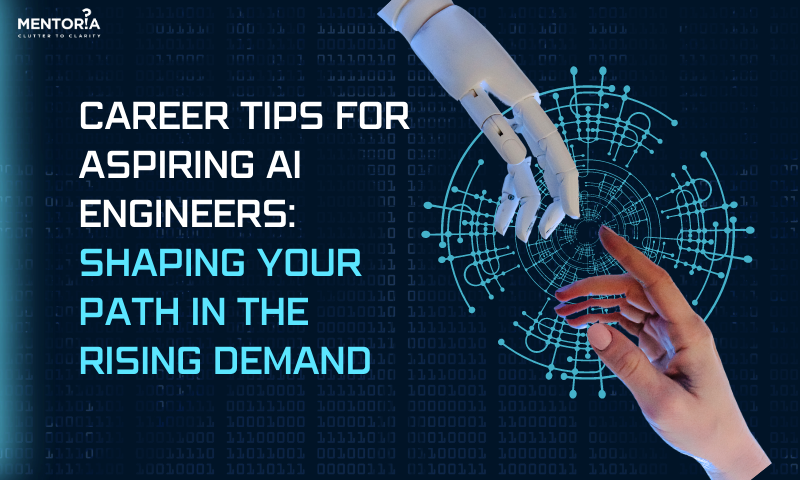Career Tips For Aspiring AI Engineers: Shaping Your Path In The Rising Demand

Did you know that the demand for AI engineers is skyrocketing at an unprecedented rate? In this fast-paced digital era, where algorithms drive innovation and intelligent machines shape the future, AI has emerged as the Holy Grail of technology. Aspiring AI engineers are on a quest to unlock the secrets of artificial intelligence, but the path to success can be both thrilling and daunting. Fear not, for in this blog, we will unveil a treasure trove of career tips that will empower you to navigate the ever-evolving landscape of AI and shape your path in the rising demand for skilled professionals. So, gear up, fasten your neural networks, and prepare to embark on a journey that will propel your career to new heights in the realm of artificial intelligence.
Master The Fundamentals
Building a strong foundation is vital for aspiring AI engineers. Start by immersing yourself in the fundamentals of mathematics, statistics, and computer science. Gain a solid understanding of concepts such as linear algebra, calculus, probability theory, and algorithms. These core skills will form the backbone of your AI knowledge and enable you to develop advanced models and algorithms with ease. Additionally, familiarise yourself with programming languages commonly used in AI, such as Python or R, and learn how to manipulate and analyse data effectively.
Embrace Lifelong Learning
In the ever-evolving field of AI, embracing lifelong learning is not just an option—it’s a necessity. Did you know that 85% of AI professionals believe that continuous learning is crucial for career advancement in this rapidly changing landscape? Keep yourself updated with the latest research papers, attend conferences and workshops, and follow reputable blogs and publications. Online platforms like Coursera, edX, and Udacity offer a wide range of AI-related courses, enabling you to expand your knowledge and learn from industry experts. In fact, studies show that professionals who engage in online learning are 73% more likely to secure job opportunities in AI-related fields. Actively engage in AI communities, participate in forums and discussion groups, and collaborate with like-minded individuals. By staying curious and continuously learning, you can remain at the forefront of AI advancements.
Diversify Your Skill Set
While proficiency in machine learning and programming is essential, it’s advantageous to diversify your skill set within the AI domain. Develop expertise in specialised areas such as natural language processing (NLP), computer vision, robotics, or data engineering. This breadth of knowledge will make you a well-rounded AI engineer capable of tackling a wide range of projects and collaborating with experts from different domains. It also opens up more diverse career opportunities and makes you adaptable to emerging trends in the field.
Build A Strong Portfolio
In the competitive AI industry, a strong portfolio is crucial for showcasing your practical skills and attracting potential employers or clients. Develop personal AI projects that highlight your ability to solve real-world problems. Participate in Kaggle competitions to demonstrate your data analysis and modelling expertise. Contribute to open-source AI projects, where you can showcase your coding skills and collaborative abilities. A robust portfolio not only serves as evidence of your capabilities but also gives you a platform to share your work with the AI community and gain valuable feedback. So, how can you create a standout tech portfolio? Here are some essential tips to help you get started:
- Showcase Your AI Projects: Your portfolio should feature a collection of personal AI projects that highlight your ability to solve real-world problems. Choose projects that demonstrate a diverse range of skills, from data analysis and machine learning to natural language processing and computer vision. Clearly articulate the problem, your approach, and the outcomes achieved, providing concrete evidence of your abilities.
- Participate in Kaggle Competitions: Kaggle competitions are a fantastic platform to showcase your data analysis and modelling expertise. Engage in these competitions, tackling complex AI challenges and striving to achieve high rankings. Highlight your participation, share your approach, and showcase any achievements or awards received. This demonstrates your competitiveness and ability to deliver results in a competitive environment.
- Contribute to Open-Source AI Projects: Collaborating on open-source AI projects not only showcases your coding skills but also demonstrates your ability to work as part of a team. Get involved in reputable open-source projects, actively contribute code, provide bug fixes, and offer valuable insights. This demonstrates your commitment to the AI community and your ability to collaborate effectively on larger-scale projects.
- Document Your Process: When creating your tech portfolio, remember to document your process and provide insights into your decision-making. Explain the challenges you encountered, the strategies you implemented, and the lessons you learned along the way. This not only demonstrates your technical skills but also showcases your critical thinking and problem-solving abilities.
- Share Code and Insights: In the AI community, sharing is caring. Include links to your GitHub repositories or other platforms where you have shared your code and insights. This not only allows potential employers or clients to delve deeper into your projects but also positions you as a contributor to the AI community.
- Incorporate Visuals and Storytelling: Make your tech portfolio visually appealing and engaging. Utilise charts, graphs, and visuals to showcase your data analysis results and project outcomes. Incorporate storytelling elements to narrate your AI journey, explaining the problem, your approach, and the impact of your work. This captivates the reader and helps them understand the significance of your contributions.
Gain Industry Experience
While academic knowledge is important, gaining industry experience provides invaluable insights into the practical applications of AI. Here are some ways you can improve your skills to enhance your chances of securing industry experience and better opportunities:
- Continuous Learning: The field of AI is constantly evolving, so it’s crucial to stay updated with the latest advancements and technologies. Engage in self-study, online courses, and workshops to expand your knowledge and acquire new skills. Platforms like Coursera, edX, and Udacity offer a plethora of AI-related courses and specialisations.
- Personal Projects: Undertake personal AI projects to showcase your skills and creativity. Develop AI applications, participate in Kaggle competitions, or contribute to open-source projects. These projects not only demonstrate your technical abilities but also highlight your passion and commitment to AI.
- Collaborative Learning: Join AI communities, forums, and meetups to network with like-minded individuals. Engaging in discussions and collaborations with peers can enhance your problem-solving skills, expose you to different perspectives, and broaden your understanding of AI applications in various domains.
- Hackathons and Competitions: Participate in AI hackathons and competitions to sharpen your skills and gain practical experience. These events provide opportunities to work on real-world challenges, collaborate with industry professionals, and showcase your abilities to potential employers.
- Networking and Mentoring: Attend industry conferences, webinars, and networking events to connect with professionals in the AI field. Building meaningful relationships with experienced AI engineers and mentors can provide guidance, advice, and potential job referrals.
- Stay Updated on Industry Trends: Follow industry blogs, publications, and thought leaders in AI to stay abreast of the latest trends and developments. This knowledge not only demonstrates your interest and enthusiasm but also prepares you for discussions during interviews or networking opportunities.
By continuously improving your skill set and actively seeking opportunities to gain industry experience, you will position yourself as a desirable candidate for internships, research positions, and future job opportunities. Remember, the journey to becoming a successful AI engineer is not just about academic qualifications but also about practical experience and a thirst for knowledge. So, embrace the challenge, keep learning, and let your passion for AI guide you on the path to success.
Cultivate Soft Skills
AI engineering involves more than technical expertise; strong soft skills are essential for success. Effective communication, teamwork, and problem-solving abilities are highly valued in the industry. Develop your ability to articulate complex concepts clearly and concisely, as you will often need to communicate your ideas to non-technical stakeholders. Collaborate with others, embrace diverse perspectives, and adapt to different working styles. Cultivating your soft skills will not only make you a more effective AI engineer but also enhance your leadership potential and enable you to navigate complex projects and collaborations successfully.
Stay Ethical And Responsible
As AI technology becomes increasingly powerful, it’s crucial for AI engineers to consider the ethical implications of their work. Be mindful of biases in data and algorithms and work towards developing fair and unbiased AI systems. Understand privacy concerns and ensure that your solutions respect user privacy and data protection. Stay informed about ethical guidelines and best practices in the AI field, and contribute to the responsible development and deployment of AI applications. By prioritising ethics and social responsibility, you can help build trust in AI and ensure that it benefits society as a whole.
Mentoria’s Key To Success
Becoming an AI engineer is an exciting journey filled with opportunities for growth and impact. By mastering the fundamentals, embracing lifelong learning, diversifying your skill set, building a strong portfolio, gaining industry experience, cultivating soft skills, and staying ethical, you can shape your path towards a successful AI engineering career. Remember, the demand for skilled AI engineers is on the rise, and by following these career tips, you can position yourself for success in this thriving field. With the right guidance and support, you can accelerate your journey to becoming an AI engineer. That’s where Mentoria comes in. Mentoria offers tailored career guidance, mentorship, and resources to help you navigate the path to a successful AI engineering career. So, embark on your AI journey with passion, dedication, and a commitment to make a difference in the world through the power of artificial intelligence.










